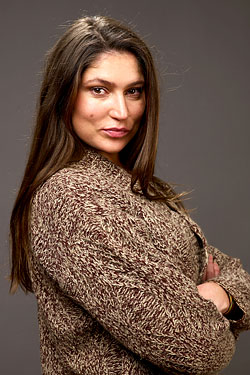
One of the most exciting performances at Sundance this year came from a newcomer whose (last) name will nevertheless sound familiar: Stella Schnabel, daughter of Julian Schnabel and his first wife, Jacqueline Beaurang, is at the center of Ry Russo-Young’s improvised, mixed-media feature, You Won’t Miss Me, which tells the fragmented story of a twenty-something actress recently released from a psychiatric hospital. The film and the character were developed by Schnabel and Russo-Young together over the course of a year. We spoke to Schnabel, who also carries a co-writing credit on the film, about improvising scenes with non-actors, the difference between acting and real life, and her famous father.
How did you and Ry meet?
I’ve known Ry since I was 5 years old. She was my sister’s best friend growing up. We all went to the same schools. My sister and Ry made a movie together when they were in high school. And a good friend of mine was in her first feature, Orphans. We hadn’t seen each other in a while, but we bumped into each other one day, and we said, “We should make a movie together.”
And the two of you developed this script and this character together?
Yes. I think what actually happens to the character was something I’d always had in my mind. We both had ideas for scenes, some of it based on real life, some of it based just on ideas we threw out there. For example, I don’t have crushes on people, but I invented a story about kind of liking a guy in a band and then going to Atlantic City to see him play, accompanied by a stranger.
That is a great scene, by the way. Was that improvised?
It wasn’t scripted or anything. That was spontaneous for me. I only knew a little bit about Carlen, the girl I was going with. I know Ry said things to her, to get her going. So we wind up in this situation where it’s already three in the morning, and I want to hang out with my friend who’s in the band, Donald, whom I know really well. But he’s passed out, and Carlen wants to hook up with this other guy. She’s really teasing him and leading him on. He’s calling my phone to hook up with her. I got annoyed with that, and the scene just developed. I was really pushing it with her.
You’ve had a lot of training as an actor. Was it tough working with non-actors?
Sometimes; it can be very hard. I don’t want to say mean things about other people, but sometimes you have to pull things out of them. And you wind up saying things to get them to react, but afterwards you have to make sure they’re okay: “I wasn’t saying this to you. I was saying it to your character!” But some of them were great. Simon O’Connor, who is actually a musician in a band called Amazing Babies, was great.
Do you think you ever go too far in terms of losing yourself in your character?
I hope there isn’t any “acting” in the film. But I also don’t want people to think this is me. It was done in such a way — we were doing it ourselves, shooting in our own homes. And I’d never done a movie before. So I was a little freaked out that people might think that I’m just like this character. When I was doing it, I was thinking, “No one’s going to watch this. Everyone’s going to hate this character. I would hate this character.”
What do you think of this character today, now that it’s been some time since you shot the film?
I don’t really know how to watch myself. I guess to look at myself physically is a whole other thing. I find some of the things she says very funny. And I’m happy with the acting in the film.
Your father is a great director of actors, and you’ve actually had parts in a couple of his films. What have you learned from him?
To just be as natural as possible. To ask yourself: “What would you do in this situation? What would you really do?”
Has he seen the film yet?
Neither of my parents have seen it. My dad really wants to see it. A number of people have seen it and told him good things, so he’s curious.


